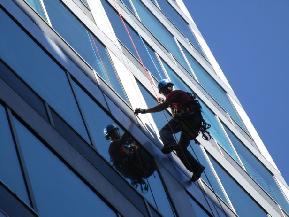 Christy Kim, AIA, CASp
Christy Kim, AIA, CASp
The world of accessibility laws is complex with new laws being passed regularly. Recently we’ve been getting questions about a new California law, Assembly Bill (AB) 2093 disability access, which was signed into law in September 2016 and is effective for commercial property leases or rental agreement executed on or after January 1, 2017.
The goal of AB 2093 is to encourage the disclosure of any accessibility concerns between landlord and tenant during lease negotiations and to provide a framework for those concerns to be addressed. California and other states have seen a large and growing number of accessibility lawsuits related to the design and construction of public accommodations. Many of these lawsuits are from plaintiffs going after California’s $4000 per violation reward.
California’s AB 2093 explained
AB 2093 amends an existing disability access law (SB 1186) which requires a landlord to state on every lease form or rental agreement executed on or after July 1, 2013, whether or not the property has been determined by a CASp to meet all applicable construction-related accessibility standards. A CASp is a Certified Access Specialist – more on that below. In addition to the statement on the lease form, AB 2093 now requires additional disclosure and language as follows:
- If inspected by A CASp: If the property has has a CASp inspection and there have been no alterations affecting accessibility since the inspection, the commercial property owner/landlord shall provide the prospective tenant with a copy of the CASp report at least 48 hours prior to the execution of the lease or rental agreement.
- If meets applicable standards: If the premises have been issued an inspection report indicating that they meet applicable standards, a copy of this report shall be provided to the prospective tenant within seven days of the lease agreement execution date
- If no CASp report: If the premises have not been issued a disability access inspection certificate/CASP report, there must be a statement on the lease stating that, a) a CASp can inspect the property, b) a CASp inspection is not required by law, c) upon request of the prospective tenant, the property owner must allow a CASp engaged by the prospective tenant to inspect the premises, and d) that the parties must mutually agree on the arrangements for the time and manner of the inspection, the payment of the associated fee, and the cost of making repairs, if specified.
- Responsibility: This bill establishes that the landlord is responsible for repairs unless otherwise determined in the lease.
- Lease cancellation: If the landlord orders the report it must allow the tenant the opportunity to review it and if the landlord doesn’t respond within 48 hours of signing the lease the tenant has the right to cancel the lease. The tenant may also cancel the lease based on information in the report within 72 hours after execution.
To reiterate, AB 2093 does not say that a CASp inspection is required – no California laws say that, the CASp program was created as a voluntary measure to improve accessibility and reduce lawsuits. AB 2093 essentially seeks to make very clear the language and framework regarding how accessibility concerns should be handled between the owner/landlord and tenant, so that future lawsuits can be avoided. It also discloses the existing violations at a property during lease negotiations to encourage owners to be proactive about removing known barriers, ultimately with the goal to reduce unwarranted litigation.
More on the CASp program
California created the Certified Access Specialist or CASp certification and program to help meet the need for qualified professionals in the accessibility field. A CASp is someone with specialized knowledge of the state and federal accessibility laws and codes, such as ADA and many others, who can perform an evaluation of a property for compliance with the applicable construction related accessibility standards. Once the evaluation is complete, a report will be provided identifying the non-compliant issues at the property, recommendations for barrier removal, and a schedule for a timeline of completion of improvements toward property compliance. If there are no non-compliant issues at the property, the report will indicate that the property “meets applicable standards.”
A CASp report can offer “qualified defendant” status in the event of a construction-related accessibility lawsuit. In the event you become a defendant in a construction related accessibility claim against your place of public accommodation, as a “qualified defendant” you may request a court stay and an early evaluation conference. Additionally, statutory damages can be reduced in certain circumstances.
Accessibility outside of CA
California is not the only state that has specific accessibility programs or credentials. For example Texas has the Registered Accessibility Specialist program which establishes a procedure during the plan review and property inspection process to support new developments with the accessibility regulations. Numerous other federal, state and local accessibility laws exist as well that could apply to your property. For a summary and some history on ADA and other major accessibility laws, check out my colleague Ira Grossman’s blog here.
If you have questions on how to handle accessibility concerns in your transactions, please feel free to reach out to me.

















 Copyright © 2024 ALM Global, LLC. All Rights Reserved.
Copyright © 2024 ALM Global, LLC. All Rights Reserved.